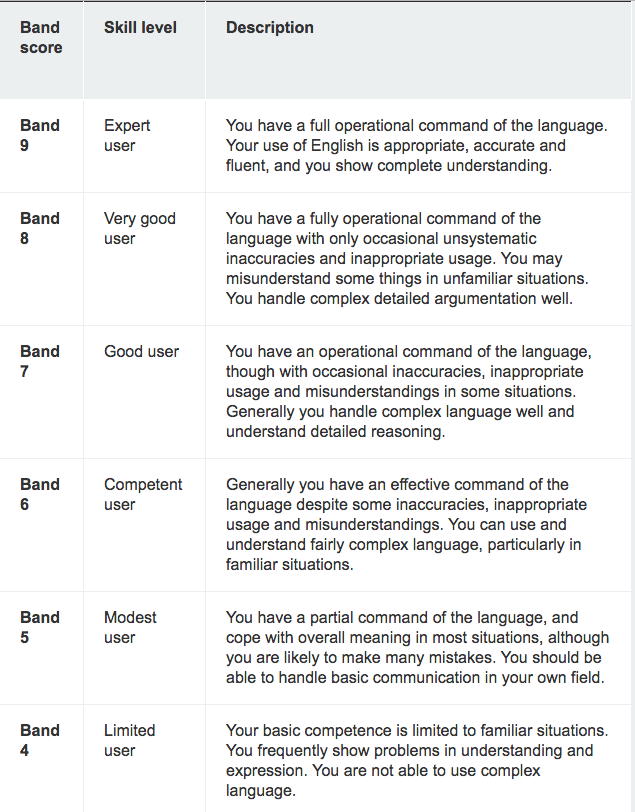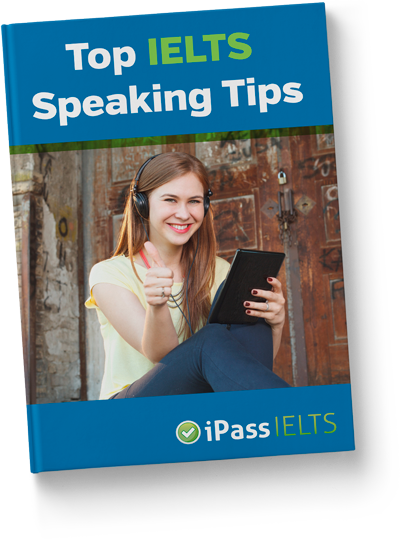What is the IELTS test?
IELTS (International English Language Testing System) is an internationally recognised test of English proficiency which is accepted by more than 9,000 organisations worldwide.
Over 3 million tests were taken in the last year making IELTS the most widely used English language test for study, work and migration in the world.
IELTS is jointly owned by the British Council, IDP Australia and Cambridge ELA and it assesses the use of English as an international language in 4 key areas of communication: speaking; listening; writing; reading.
The tests are written by a team of writers from different English-speaking countries to ensure fairness and validity.
At iPassIELTS we offer free IELTS practice as well as a range of tutored online preparation courses to help you get the IELTS band score you need.
How is the IELTS test assessed
The IELTS test consists of 4 components: Listening; Reading; Writing; Speaking and for each sub-test you are awarded a band score between 1 and 9 depending on your language proficiency in each skill. The following image shows you how each score (band 4 to band 9) corresponds to language proficiency.

Half band scores are also awarded so, for example, you could get 6 in Listening, 7 in Reading, 6.5 in Writing and 7.5 in Speaking.
In IELTS you are also given given an overall band score which is an average of your 4 individual scores. So in the above example, the average is 6.75 so the overall band score would be rounded up to band 7. You can learn more about IELTS scores are calculated here.
When and where can IELTS be taken?
IELTS tests are offered in more than 1,200 test centres in over 140 countries across the globe. There are up to 48 test dates available per year. Each test centre offers tests up to four times a month depending on local demand.
This UK government document shows the complete list of approved SELT (secure English language tests) IELTS test centres around the world.
Countries which have 5 or more SELT IELTS test centres include:
Bangladesh / Brazil / Canada / China / Egypt / Hong Kong / India / Kazakhstan / Pakistan / Philippines / Russia / Saudi Arabia / Thailand / Turkey / United Arab Emirates / United States / United Kingdom
Click here to find your nearest test centre.
What is the difference between Academic IELTS and General Training IELTS?
Academic IELTS – is required for university entrance either in an English-speaking country or where the degree or post-graduate course is taught in English. Many professional boards in medicine (NMC, GMC), teaching and engineering also require non-native English speakers to take the Academic test as part of their professional registration.
General Training IELTS – is mainly required for immigration purposes / visa applications or for those who want to do work experience or training programmes or complete their secondary education in an English-speaking country.
The Listening and Speaking components of both tests are exactly the same, but the Reading and Writing components are different.
It is advisable to contact the organisation or institution to which you are applying to find out which test you need to take, because you will need to indicate this when completing the IELTS application form.
You should also find out which band score you need to achieve because there will be variations between different countries, universities and professional bodies.
Is IELTS for UKVI a different test?
No. IELTS for UKVI is the same test as Academic IELTS or General Training IELTS, both of which are applicable if you are applying for Tier 1 and Tier 2 visas to the UK. The only differences are administrative. For example, the Test Report Forms will be slightly different, to show that you have taken the test at an IELTS UK visa session. But in terms of exam format, procedure, content, level and scoring, there is no difference.
What is IELTS Life Skills?
IELTS Life skills is for people who are applying for a ‘family of a settled person’ UK visa (A1 level), extension of a ‘family of a settled person’ UK visa (A2 level) or for indefinite leave to remain or UK citizenship (B1 level).
It is a relatively new test, approved by UKVI as a Secure English Language Test (SELT).
It’s for people who need to show they have speaking and listening skills at Level A1, A2 or B1 of the Common European Framework of Reference for Languages (see chart below)
How do IELTS band scores compare with CLB (Canadian Language Benchmark) scores?
| CLB level | IELTS listening | IELTS reading | IELTS writing | IELTS speaking |
|---|---|---|---|---|
| 10 | 8.5 | 8.0 | 7.5 | 7.5 | 9 | 8.0 | 7.0 | 7.0 | 7.0 | 8 | 7.5 | 6.5 | 6.5 | 6.5 | 7 | 6.0 | 6.0 | 6.0 | 6.0 | 6 | 5.5 | 5.0 | 5.5 | 5.5 | 5 | 5.0 | 4.0 | 5.0 | 5.0 | 4 | 4.5 | 3.5 | 4.0 | 4.0 |
How do IELTS band scores compare with TOEFL scores?
| IELTS band score | TOEFL score |
|---|---|
| 5 | 35-45 | 5.5 | 46-59 | 6 | 60-78 | 6.5 | 79-93 | 7 | 94-101 | 7.5 | 102-109 | 8 | 110-114 | 8.5 | 115-117 | 9 | 118-120 |
How do IELTS band scores compare with CEFR levels?
The following chart shows how each IELTS band score compares with the Council of Europe’s Common European Framework of Reference for Languages (CEFR)














